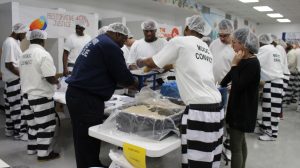
Lexi Caviness (right), a UM psychology major and criminal justice minor from Ripley, joins 150 inmates from the Marshall Country Correctional Facility in Holly Springs in a Feed My Starving Children food-packing event. UM photo by Sarah Sapp
OXFORD, Miss. – Students and faculty from the University of Mississippi Department of Legal Studies recently joined forces with the Marshall County Correctional Facility in Holly Springs to pack more than 100,000 meals in one day for an organization that helps needy children.
Feed My Starving Children is a Christian nonprofit working to eliminate starvation and hunger worldwide.
“Our partnership with the Marshall County Correctional Facility is unprecedented,” said Lisa Stueckemann, development officer for Feed My Starving Children. “We are thrilled to be working with 150 offenders, plus students and faculty from Ole Miss to work to pack meals to send to children who are dealing with severe malnutrition and starvation.”
Linda Keena, interim chair for the Department of Legal Studies, teaches restorative justice and entrepreneurship courses to a group of maximum-security inmates at the facility, where the idea for the project got its start. Over the course of eight hours, the group packed enough meals to feed 277 children every day for an entire year.
“Part of what we try to do is find ways to repair harm that their behavior has caused to the community, so we decided we would try to put together this project,” Keena explained. “It has been a really rewarding day.
“The offenders who graduate from these classes feel a great sense of pride and accomplishment. They feel validated that their time has been of real value to others, and that is really what we want to accomplish from it. At the end of this day, they feel like they have made a difference in someone else’s life in a positive way.”
For Keena, this project was a valuable service-learning experience for her criminal justice students.
“We’ve had a number of student volunteers who came here,” She said. “They have an opportunity to put into place the things they’re learning in the classroom; to engage with the offenders, staff and administrators, and to come back to volunteer. That helps them as they prepare for their careers in corrections.”
Kornisha Johnson, a senior criminal justice major from Sallis, described the experience as a blessing.
“This project has meant a lot to me,” Johnson said. “Back home, there is little opportunity and I’m surrounded by poverty, so to be able to give back to so many children is amazing.
“Also, being able to work alongside the inmates has been a positive thing – just letting them know that they are not what people say they are. They are not their crimes. It has been a beautiful and rewarding experience to help fundraise and put this together.”
Lexi Caviness, a sophomore criminal justice minor from Ripley, said the experience has changed her perspective of the incarcerated.
“Before coming into the class I had a different idea of them,” Caviness said. “Just getting to talk with them and realize most of them are trying to better themselves. It is really nice to see how they are still trying to give back, even though they are in here for a long time.”
Many of the offenders, including Richard Moore of Walls, expressed gratitude for getting to do something positive in reparation for their past wrongdoings.
“We’re all in here for doing something destructive, and society looks at us like we are throwaways,” Moore said. “This gives us an opportunity to show that we have changed and that we are capable of doing something good.
“It is impressive to me, because prison is a place associated with hopelessness, but here we are boxing up hope to send to other countries, to children.”
The inmates first had to pass the Ice House Entrepreneurship class as a prerequisite to the restorative justice class to participate in the food-packing event, Keena said.
“The Ice House Entrepreneurship class teaches them to look at how to solve other people’s problems instead of looking at how they alone can benefit, because that is what successful entrepreneurs do,” Keena said. “It was actually one of the offender’s capstone projects from the class that sparked the idea for the event as a social entrepreneurship endeavor.”
Gary Schoeniger, founder and CEO of Entrepreneurial Learning Initiative and co-author of the Ice House Entrepreneurship book, flew in from his headquarters in Ohio for the packing event. Schoeniger and Keena have spoken at venues across the country, sharing the effective use of the Ice House Entrepreneurship program in prison systems.
Students in the Department of Legal Studies’ criminal justice program can declare an emphasis in corrections. They are taught the skills they will need to manage prisoners, interact with adult parolees and probationers, and supervise juveniles in the community or secured juvenile facilities.
Students learn how courts and prisons work and different strategies for dealing with inmates, probationers and parolees, including rehabilitation efforts and counseling.
For more information about programs on study in criminal justice, email legalstu@olemiss.edu or visit http://legalstudies.olemiss.edu/.